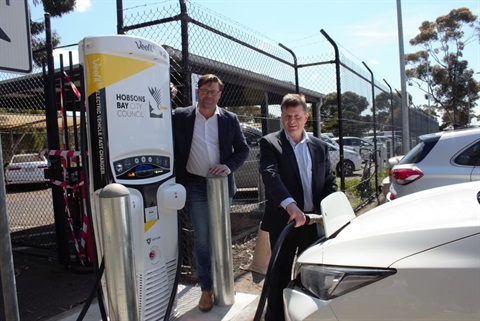
Council has announced a range of initiatives to address climate change and bring it closer to its goal of zero net emissions for the organisation by 2020 and the community by 2030.
The initiatives include adopting a fleet of electric vehicles, the installation of a 50kW DC electric vehicle fast-charging station for community use, signing on to participate in the largest renewable energy power purchase agreement in Australia, and fast tracking the installation of solar and building retrofits to make our buildings carbon neutral.
Mayor of Hobsons Bay Councillor Jonathon Marsden said that the most recent decisions will see Council's targets achieved.
"We are doing our bit to be carbon neutral by 2020 and that is by reducing our base energy usage and by embracing more sustainable energy sources," said Cr Marsden.
"We are reducing our base energy requirements by fast tracking the installation of solar panels on Council buildings, transitioning the Council fleet to electric vehicles, installing LED street lights, making our buildings more efficient through incorporating environmentally sustainable design to current and future buildings.
"We anticipate that all of these changes will result in a 70 per cent reduction in our base energy consumption over the next 10 years."
Council also recently committed to sourcing 30 per cent of our current energy usage from Victorian renewable energy sources by signing on to the Local Government Power Purchase Agreement (PPA), the largest renewable energy power purchase agreement in Australia.
"Coupled with our energy savings this agreement will see us hit our zero net emissions targets," the Mayor said.
Council's new electric vehicle fleet, which was commissioned into service in August 2019, includes three Nissan Leafs, one Renault Zoe and one Renault Kangoo Z.E. van.
Cr Marsden said that compared to petrol-powered cars, electric vehicles generate far less greenhouse gas emissions and air pollutants and have lower running costs.
"The running cost is approximately $4.50 in electricity per 100km compared to around $16.65 of fuel to travel the same distance in an average petrol vehicle," Cr Marsden said.
"Electric cars are the way of the future and we are committed to not only putting our money where our mouth is and switching our own vehicles to electric, but also to helping our community to go electric.
"This is why we are proud to offer the community the 50kW DC fast-charging station at the Altona Civic Centre which will be free to use for a trial period.
"The charging station can charge a DC charge compatible vehicle in as little as 30-40 minutes, depending on the vehicle and its battery state, compared to a 7-8 hour charge time using a slower charger.
"This will be the only high capacity electric vehicle fast charging station of its capacity between Torquay and the city which will plug a major gap in our city's electric vehicle support infrastructure, allowing motorists to top-up their vehicle as they travel across the western suburbs.
"It will also help people who live in apartments or do not have off-street parking to embrace electric vehicle technology by having another option to charge, bringing us one step closer to achieving zero net emissions for the community by 2030."






